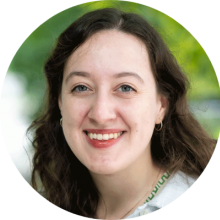UBC Health supports doctoral students through the Health Equity Stream of the Public Scholars Initiative to engage in tailored learning and networking focused on building an interdisciplinary community of scholars who are working to address complex questions and challenges of our world through research that improves health equity.
Health Equity Scholars
Learn more about this year's cohort of the Public Scholars Initiative
 | Shams Moh'd Fares Khalaf Al-AnziProgram: Doctor of Philosophy in Nursing Read more about Shams |
 | Kaitlin BerrisProgram: Doctor of Philosophy in Women+ and Children's Health Sciences Nutrition is a highly personal topic that most people have an opinion on. A family’s underlying values over how they feed their children in sickness and in health is often left at the door when a child is admitted to the pediatric intensive care unit, where survival is the primary focus. However, what we are left with is a depersonalized food plan that does not integrate how families want their children to heal as their path out of ICU becomes clearer. My work is focused on identifying the time and method for family inclusion in decision making regarding how we nourish their child. This will look like a standardized communication tool with accessible information for parents/guardians to make informed decisions within the confines of a hospital setting. Addressing a person’s right to food which is culturally safe is at the heart of my work and where I hope to have the most influence within healthcare. Read more about Kaitlin |
 | Shirley ChenProgram: Doctor of Philosophy in Population and Public Health Climate change is driving more frequent and severe natural disasters in Canada, leading to increasing numbers of community evacuations. While evacuations protect people from the imminent harms of disasters, the process can have significant short- and long-term health impacts. Individuals and communities already facing social and economic inequities are disproportionately affected by both evacuations and their health effects. My research examines how factors such as pre-existing health conditions and social circumstances relate to short- and long-term outcomes including mental health, respiratory and cardiovascular conditions, injury, infection, and healthcare access. By engaging directly with communities affected by climate-related evacuations, the organizations that support them, and partners across health and emergency response systems, I aim to understand how health impacts and inequities are distributed. This work supports the development of public health tools and monitoring systems that are responsive to the needs of those most affected. Read more about Shirley |
 | Dana DmytroProgram: Doctor of Philosophy in School and Applied Child Psychology I was motivated to join the Health Equity Stream given the potential for my research to impact upstream school-based approaches that address the drug toxicity crisis that has claimed over 50,000 lives in Canada since 2016. While substance use occurs along a spectrum of risk, ranging from non-use, to low- and high-risk use, to substance use disorders that carry significant personal and societal costs, protective and risk factors are not equally distributed within the population. I am motivated to support health equity for Canadian children, youth and families through my work, specifically to support schools in their efforts to build students’ resilience and shift trajectories for those most at risk. Read more about Dana |
 | Jalisa KarimProgram: Doctor of Philosophy in Women+ and Children's Health Sciences
Women’s health has historically been understudied and underfunded. As a result, despite being incredibly common, endometriosis is still not well understood. Endometriosis is often associated with severe pain, and women are more likely than men to have physical symptoms like pain being misattributed as being psychological. In Canada, it takes over 5 years on average from symptom onset to diagnosis by a physician. Even after diagnosis, endometriosis patients describe difficulties in receiving adequate treatments and accessing information about their condition. Delays in treatment may also lead to barriers in endometriosis patients’ access to reproductive choice, especially regarding family planning and preventing/treating infertility. Results from my research project interviewing endometriosis patients about treatment decision-making can be used to address health inequities by providing a better understanding of how to create more supportive healthcare environments to promote better health among endometriosis patients. Co-creating accessible educational resources in collaboration with endometriosis patients will also help individuals better understand their options and what to expect when seeking care. Read more about Jalisa |
 | Chen-Mei Margaret LinProgram: Doctor of Philosophy in Nursing In my research, I work closely with older adults, caregivers, care providers, and staff from health and community organizations to co-create solutions that improve care for older adults. I believe that advancing health equity means ensuring that those most affected by care decisions have a meaningful voice in shaping them. Locally, I aim to share practical, partner-informed recommendations that help make care more inclusive and equitable within our health system. Nationally and globally, I hope to contribute adaptable care models that promote holistic, proactive, and culturally responsive approaches to aging. I also make it a priority to recognize the expertise of my partners through co-creation and honoraria, which I see as essential to addressing systemic inequities in research. By demonstrating the value of interdisciplinary and intersectoral collaboration, I want to inspire broader efforts to embed equity into health research and system improvement around the world. Read more about Margaret |
 | Naomi Maldonando-RodriguezProgram: Doctor of Philosophy in Kinesiology I hope my research can bring awareness to and open up conversations about the intersecting challenges that migrant women living with HIV (WLWH) face. Research has shown that both migrant women and WLWH report several unmet health needs and significant barriers to accessing and engaging healthcare in Canada, but little research has attended to the intersecting health needs of migrant WLWH. Accordingly, my PhD research seeks to understand migrant WLWH’s healthcare experiences and the structural and institutional factors that shape these experiences. By using a community-based research approach and working alongside HIV-serving organizations (i.e., Ribbon Community and the Afro-Canadian Positive Network of BC), our research will highlight the work that is already being done in community so that future research may work in coalition and collaboration with existing efforts. Lastly, as we know that many health and social inequities are maintained at institutional and structural levels, my research will begin to articulate the complex intersections between gender, race, migration, and health and help bring these conversations into the public, policy, and practice spheres. Read more about Naomi |
 | Olivia MaracleProgram: Doctor of Philosophy in Nursing Too often our approaches in health care are shortsighted, pan or umbrella-aimed, and grossly Eurocentric and colonial. Traditional is conventional and does not stray from the usual. As an Indigenous mixed-race academic, I spend time exploring my own unique pathways of sharing and learning that aim to free me and those I aim to learn with. Here we break away from the assimilative ways we have been meant to seek Knowledges – turning away from the suffocating rules we have been pressured to acclimatize and obey as the hard line to bind with. I aim to honor my own Kanyen’kehá:ka ancestry by appreciating Haudenosaunee ways of attaining skén:nen by actively interacting with Clan-based organizational systems to learn more about my community of Indigenous nurses. I encourage other Indigenous academics to continue to reach back and honor our Storyworks and lessons, bringing them forward in ways that have us reaching forward for further stars, bringing us closer to our individual homes-away-from-home. |
 | Kimberly RondeauProgram: Doctor of Philosophy in Interdisciplinary Studies I was drawn to this stream because it emphasizes research that is not only academically rigorous but can extend to community partnership. Health equity work requires engaging with people whose voices are too often excluded from research and policy decisions. Through collaboration with individuals who have lived experience of homelessness and incarceration, I hope to co-create knowledge that is relevant, respectful, and capable of informing meaningful change. By joining the Health Equity Stream, I seek to strengthen my ability to bridge data-driven research with lived experience, to translate evidence into action, and to ensure that scholarship contributes directly to the wellbeing of those most affected by systemic inequities. This aligns with my long-term goal of advancing evidence-informed policy that promotes health and social justice. |

| Amrit TiwanaProgram: Doctor of Philosophy in Planning During my first research position collecting field data, I would notice how some neighbourhoods had far more resources than others, with better schools, cleaner environments, and easier access to healthcare.These differences made me aware early on of the unequal opportunities people experience based simply on where they live. This realization has shaped both my academic and professional journey at the intersection of urban planning and public health. I now study how geographic location and access to healthcare services influence health outcomes. For me, health equity is not just an abstract concept but something rooted in lived experiences and observed realities. It drives my commitment to advancing research and policies that ensure everyone, regardless of their neighbourhood or circumstances, has equitable access to the resources necessary for good health. Read more about Amrit
|
 | Amin AdibiProgram: Doctor of Philosophy in Pharmaceutical Sciences Read more about Amin |
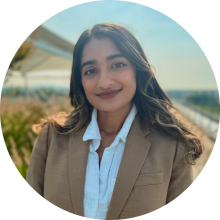 | Manvi BhallaProgram: Doctor of Philosophy in Resources, Environment and Sustainability I am motivated by the need to create a more just, inclusive world, where underserved and marginalized communities are not merely surviving but thriving. My experiences growing up in a low-income, racialized newcomer-dense neighbourhood, coupled with 15 years of community organizing experience created the foundation for my commitment to advancing intersectional, anti-colonial environmental health justice. Academically, I became interested in bridging health equity to the environmental context after an undergraduate endocrine physiology course asked us to research the cause behind fertility issues in Aamjiwnaang First Nation. I was introduced to the devastating intergenerational health impacts of endocrine disrupting chemicals (EDCs) due to industrial activities and pollution. I could not believe that we lack sufficient regulations to prevent this— particularly for Indigenous communities who continue to experience compounding health inequities due to settler colonialism. During my MSc in public health & health systems, my climate health research identified a need for greater interdisciplinarity in policy-making & increased inclusion of lived experiences from structurally vulnerable populations in the design of regulatory practices and accountability structures. Thus, for my PhD, I was inspired to pursue research which ensures that communities whose health outcomes are most affected by environmental issues are meaningfully involved in designing solutions. Read more about Manvi and visit her website
|
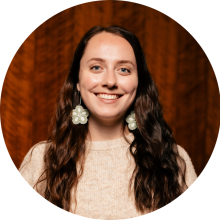 | Logan BurdProgram: Interdisciplinary Graduate Studies - Doctor of Philosophy in Community Engagement, Social Change, and Equity My hope is that this research will contribute to the representation and distinct understanding of Métis ways of knowing and being within health systems and health equity scholarship, ensuring that Métis voices—particularly those of our youth—are centred and prioritized. This collaborative and youth-led work will explore how Métis understandings of life promotion can inform upstream youth suicide prevention efforts. Métis youth are well-positioned to respond to increasing calls for better, strengths-based, youth-driven life promotion approaches to shape the future of upstream youth suicide prevention. |
 | Lindsay BurtonProgram: Doctor of Philosophy in Nursing Through collaborative and action-oriented scholarship, I hope to contribute to the design of health systems that prioritize equity, especially as digital health solutions are increasingly integrated. My research aims to center patients in health services design by fostering interdisciplinary collaboration that ensures diverse perspectives are considered. By emphasizing equity in digital health, I aim to support the development of inclusive solutions that improve access and outcomes for all patients. |
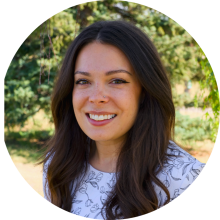 | Michelle GagnonProgram: Doctor of Philosophy in Nursing My motivation in joining the Health Equity Stream is to further develop my skills, knowledge base, and competencies to uphold a robust equity oriented lens within the field and practice of psychedelic-assisted therapy (PaT). As psychedelic medicine continues to evolve and approach wider healthcare implementation, health equity questions range from local to global involvement, including: tactics used to legitimize psychedelic substances into contemporary scientific domains from their profoundly long historical use by Indigenous nations with various associated ontologies, epistemologies, and practices; three-pronged stigmatization of PaT relating to the substances themselves, mental illness (and treatments of), and psychedelic use within policy and research realms (e.g., disproportionate incarceration of Indigenous people and people of colour for non-violent drug offences related to the ‘War on Drugs’); research designs and protocols that do not account for the contextual, relational nature of psychedelics or their application for diverse, non-dominant populations and groups; and structural inequities involving regulation (e.g., decriminalization, legalization, privatization). Through the development workshops, collaborative knowledge building, and mentorship offered by the health equity stream, I aim to enhance my deeply-rooted ethically-informed foundation to be better positioned to address and actively attend to these complex, multifaceted, imminent questions of psychedelic practice. Read more about Michelle |
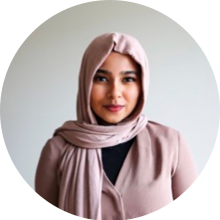 | Zeba KhanProgram: Doctor of Philosophy in Women+ and Children's Health Sciences Despite the prevalence of people who experience period pain, knowledge of period pain and how to effectively manage period pain is surprisingly low. Period pain is more severe among youth and impacts their ability to participate in day-to-day activities. By gaining a deeper understanding of how youth access period pain care, I will develop a web-based intervention that will support youth in better managing their periods. Ultimately, my project will empower youth to seek the care that they need to effectively manage their periods. Read more about Zeba |
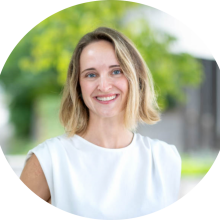 | Alexa NortonProgram: Doctor of Philosophy in Interdisciplinary Studies My work explores the social contextual forces that are at play within clinical and public health interventions that aim to reduce toxic drug-related overdoses and harms. This work is necessarily collaborative, engaging with and bridging the perspectives of clinicians, policymakers, and people who use drugs. I believe that evidence should not be limited to the sole examination of health and social outcomes. Scholarship that advances health equity must be inclusive of and responsive to the needs of individuals working within and accessing health systems. Read more about Alexa |
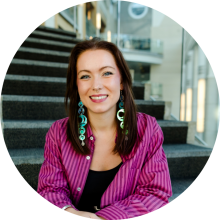 | Chelsey PerryProgram: Doctor of Philosophy in Population and Public Health nit, Chelseyhl way Nisga’a niiy Gingolx wil w̓itkgwiy. I am a citizen of the Nisga’a First Nation and come from the village of Gingolx. I use she/they pronouns and currently live on the unceded and traditional territories of the Musqueam, Squamish, and Tsleil-Waututh Nations. |
| Rachel SternProgram: Doctor of Philosophy in Geography I came to study health inequity through looking at the geographies of extreme heat. Studying heat challenges disciplinary boundaries, as it is at once a health concern, a planning issue with the built environment, an embodied and emotional experience, and an experience that takes place in the context of existing urban inequity. As a qualitatively trained geographer, I am focused on the ways that we can understand extreme heat through people’s stories about their bodies, environments, and communities. In my joint Public Scholars Project with Katherine White, who is quantitatively trained in public health methodologies, we are challenging the disciplinary binaries for addressing health inequities, asking how people’s stories and experiences can work with more traditional public health data to reveal existing inequities and possibilities for transformation. Our work with accessible indoor air sensors, diaries, and oral histories also seeks to put participants in control of their own data and life stories, sharing useful temperature and air quality data with them as they share their stories with us. Read more about Rachel
|
 | Katherine WhiteProgram: Doctor of Philosophy in Population and Public Health |
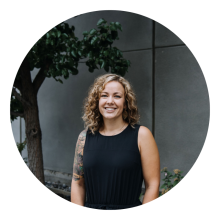 | Lauren AirthProgram: Doctor of Philosophy in Nursing I hope to see a better integration of university-community partnerships, that have the potential to address public health crises. Read more about Lauren
|
 | Kennedy BorleProgram: Doctor of Philosophy in Interdisciplinary Studies Being part of the Health Equity Stream means building an interdisciplinary community of practice with other researchers who have similar values to me where I can develop my skills and knowledge as a health equity researcher. Health equity is a human right, and my goal is to orient all of the work that I do in equity and justice. Read more about Kennedy. |
 | Andrea BurrowsProgram: Doctor of Philosophy in Nursing Imagine a society where even the most marginalized and vulnerable voices are empowered to speak out and receive the health and social care they need and deserve. I enter into my research inquiry grounded in professional nursing expertise and committed to using that knowledge to bring about a reality of ‘health’ for people and communities. Specifically, my work aims to advance our understanding of how virtual care can be a tool for building relationships with new parents in remote communities in BC. By working in partnerships to amplify the voices of underrepresented groups like new parents, we can co-create knowledge that articulates what truly matters and shapes the reality we aspire to. Read more about Andrea |
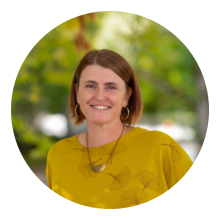 | Allison CampbellProgram: Doctor of Philosophy in Gender, Race, Sexuality and Social Justice UBC Health defines health as “an attribute of individuals, communities, and societies.” Women's health needs in Canadian prison settings are not well-understood. Women's reproductive health, including the health implications of maternal-infant connection and separation in the prison context, are even less understood. My research into reproductive experiences is BC prisons designated for women will bring focus to a critical health equity issue in our society. Moreover, knowledge gained from this work has potential to not only reduce health inequities in prisons but also promote health equity for marginalized individuals in all of our communities. Strong community partnerships are essential to this work. Read more about Allison. |
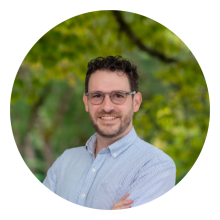 | Jonathan EaseyProgram: Doctor of Philosophy in Educational Studies My research aims to make PrEP—an HIV prevention strategy—more readily available to Queer patients in Vancouver. My motivation comes from my experience volunteering for many years at a local Queer community clinic. At the clinic, I often hear patients say, ‘I had to come here because my doctor wouldn’t give me PrEP.’ I also know from first-hand experience that there’s a solid base of knowledge in the community about PrEP that is often not shared by healthcare providers. I’m motivated to do this work because I know that through it, I’ll create tools to help increase PrEP access. Read more about Jonathan. |
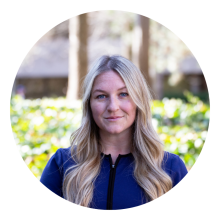 | Katherine HastingsProgram: Doctor of Philosophy in Population and Public Health This work sets out to establish an inclusive and responsive suicide care framework within an integrated youth services network in BC. By engaging youth, families, and service providers, we will identify meaningful and tangible ways to enhance access, reduce stigma, and improve the quality of suicide care. Keen on youth-centered solutions, I’m hopeful that the scholarly output will be more accessible and useable across stakeholders/rightsholders groups (including policymakers), which I believe play a powerful role in systems change. Read more about Katherine. |
 | Jennifer McDermidProgram: Doctor of Philosophy in Interdisciplinary Studies |
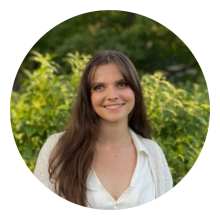 | Jennie PearsonProgram: Doctor of Philosophy in Interdisciplinary Studies By using a critical, imaginative approach, my work aims to explore beyond the current uncaring systems to identify the role of ongoing mutual aid on the pathway to building caring futures. Learning from abolitionists, my work extends definitions of health equity to consider ‘thriving’ as a collective goal, which includes joy, abundance, and rest. Using this definition, I will explore sex workers’ strategies, needs, and desires in building caring communities in which the ability to thrive is the central organizing component of our lives. Read more about Jennie. |
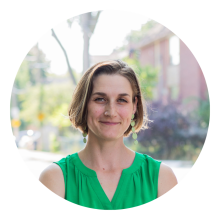 | Sabina StaempfliProgram: Doctor of Philosophy in Nursing My hope is that this research will be able to get into the hands of the families, residents, care staff, and leaders of long-term care homes who want to be the drivers of change. Research has been traditionally inaccessible to this population, and my aim is to produce something that can be used by people with various levels of abilities and education to make small incremental changes in their own long-term care home environments. By working closely with the people who will eventually be using the information we co-create, we will ensure this information is accessible and actionable and gives the right people the tools they need to start to address the persistent health inequities in the long-term care sector. Read more about Sabina. |
